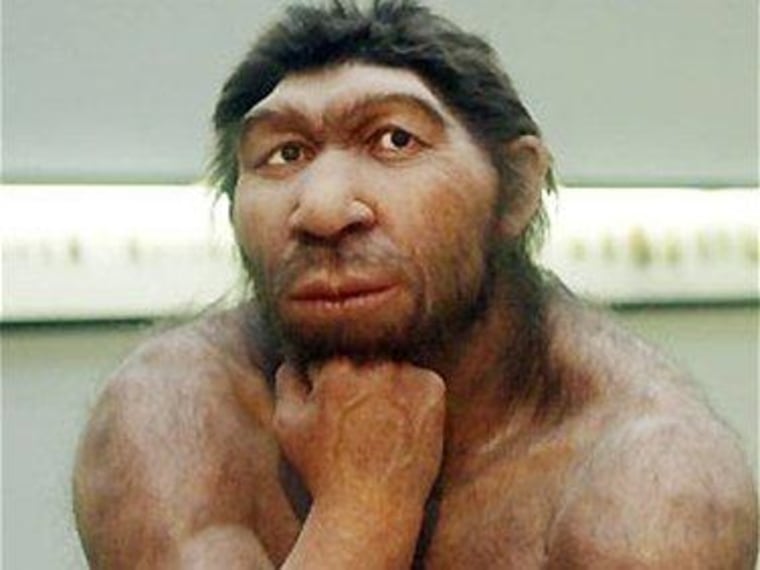Pioneering Harvard geneticist George Church suggests that the day is coming when we'll want to reverse-engineer the Neanderthal genome and pass the now-extinct creatures' advantages to our own progeny. All that's needed would be an "extremely adventurous female human" to serve as a surrogate mother.
During an interview with the German magazine Der Spiegel, Church was asked whether a Neanderthal baby would be born in his lifetime. "That depends on a hell of a lot of things," the 58-year-old replied, "but I think so."
Is he serious?
Well, Church is serious about the promise of synthetic biology, which involves tinkering with the chemical components of DNA to add artificial twists to the code of life. Microbes could be tweaked to produce better biofuels or harness solar power. White blood cells could be rejiggered to fight cancer or other diseases, using a tamed form of the HIV virus. And extinct species could be brought back to life through a combination of cloning and genetic engineering.
The species-resurrection scenario would involve inserting the reconstructed nuclear genetic material from the extinct creature into the living egg of a closely related present-day species, sparking the cell into dividing, and then implanting the resulting embryo into the womb of a female from the present-day species. It's been discussed in the context of using elephants to bring back mammoths, or chicken hens to bring back dinosaurs.
Technically speaking, the progeny wouldn't be a mammoth or a dinosaur, but rather an elephant or chicken exhibiting the genetic traits of their long-departed relatives. A similar technique could be applied using Neanderthal DNA: Chunks of reconstructed genetic code could be used to reprogram human cells and produce increasingly Neanderthal-like stem cells.
"If we do that often enough, then we would generate a stem cell line that would get closer and closer to the corresponding sequence of the Neanderthal," Church told Der Spiegel. "We developed the semi-automated procedure required to do that in my lab. Finally, we assemble all the chunks in a human stem cell, which would enable you to finally create a Neanderthal clone."
In the current political, ethical and technological climate, there's no way this scenario could come to pass. Researchers are closing in on a high-quality Neanderthal genome, but they're not quite there yet. The Russian and Korean scientists behind the mammoth-cloning project say they're years away from doing their experiment. And the idea of getting humans involved in cloning experiments is still the stuff of science fiction.
However, Church's point is that the Neanderthal genetic code may be so valuable that the hurdles will be worth overcoming.
"Neanderthals might think differently than we do," he told Der Spiegel. "We know that they had a larger cranial size. They could even be more intelligent than us. When the time comes to deal with an epidemic or getting off the planet or whatever, it's conceivable that their way of thinking could be beneficial."
Theoretically, it might be possible to create a whole population of neo-Neanderthals and see how they differ from the usual breed of Homo sapiens, Church said.
"Curiosity may be part of it, but it's not the most important driving force," Church said. "The main goal is to increase diversity. The one thing that is bad for society is low diversity. This is true for culture or evolution, for species and also for whole societies. If you become a monoculture, you are at great risk of perishing. Therefore the re-creation of Neanderthals would be mainly a question of societal risk avoidance."
Does the idea of Neanderthal surrogate motherhood sound sensible when he puts it that way? Or does it still sound like a science-fiction nightmare? Feel free to weigh in with your comments below.
More about the DNA frontier:
- How sex with Neanderthals made us stronger
- Neanderthal DNA lives on in some of us
- How synthetic biology will change us
Alan Boyle is NBCNews.com's science editor. Connect with the Cosmic Log community by "liking" the log's Facebook page, following @b0yle on Twitter and adding the Cosmic Log page to your Google+ presence. To keep up with Cosmic Log as well as NBCNews.com's other stories about science and space, sign up for the Tech & Science newsletter, delivered to your email in-box every weekday. You can also check out "The Case for Pluto," my book about the controversial dwarf planet and the search for new worlds.
